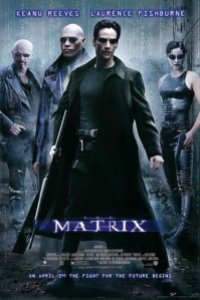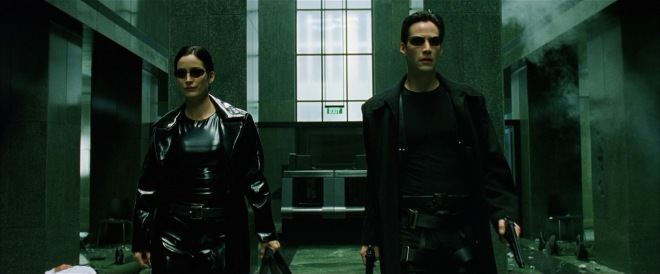 In over 15 years, nothing has aged “The Matrix.” Not two increasingly ridiculous sequels, not a series of box office bombs from the Wachowski siblings, and not the fact that these guys still carry around flip cell phones and interact with the world through pay phones. Movies released just two years later like “Minority Report” look better and more accurate technology-wise than “The Matrix” does, and yet that has not lessened the impact and influence this film still holds.
In over 15 years, nothing has aged “The Matrix.” Not two increasingly ridiculous sequels, not a series of box office bombs from the Wachowski siblings, and not the fact that these guys still carry around flip cell phones and interact with the world through pay phones. Movies released just two years later like “Minority Report” look better and more accurate technology-wise than “The Matrix” does, and yet that has not lessened the impact and influence this film still holds.
The Wachowskis, then brothers, now siblings after Larry became Lana, did something groundbreaking but also remembered to make a really, really good movie. The extended, bullet time action sequences don’t have the novelty they do in an age of CGI, but they’re the most incredible moments to watch because the Wachowksis borrow heavily from noir and Hong Kong influences. They feel right, they feel exciting, and there’s a sheer moment of timeless catharsis as we see Keanu Reeves, donned all in black leather and midnight sunglasses finishing a swing kick and striking a pose.
You cast Keanu Reeves for this reason, because he cannot act. He’s proven himself in other roles as both a competent performer and one of the worst, but “The Matrix” is not his finest. When he makes the choice to enter back into The Matrix to save Morpheus, he simply cannot emote on the level of his co-stars, capable of taking the Wachowski’s dialogue and making it as clunky as it really sounds. But then no other star would fit; they would emanate too much of their own persona, and Reeves has that clueless, cheesy quality .
“The Matrix” also has something that the really strong classics all have: a great villain. Hugo Weaving is fantastic as Agent Smith, especially when most seem to talk up Morpheus as the film’s standout. His diction and his cool delivery makes him the perfect robot killer, but he’s not averse to displaying sheer rage and loathing. There’s something delicious about how Weaving licks Morpheus’s skull and speaks of humanity’s stink as a virus in the world. He wears sunglasses in the evening, and he scowls and spits out “Mr. Anderson” with such vehemence.

Because for all of “The Matrix’s” coded symbolism and ideology about a tech-fearing future, the paradox of reality and fate, and the nature of mankind, “The Matrix” is a movie of many surface level innovations and charms. There’s no good reason why you dress up one of your agents to look like a post-punk David Byrne or Laurie Anderson. When Neo fights Morpheus to test his kung-fu knowledge, the scene could easily have gone wild in special effects and fantastical, futuristic possibilities, but it is still a grounded martial arts fight because we’d rather watch a campy, Bruce Lee inspired, realistic(ish) fight scene than something that feels fake. It’s obvious that Neo is going through a rebirth, specifically as we see him disconnect an umbilical cord and emerge from a pod of gelatinous fluid. Even Neo’s name is an anagram for “One”, so it’s not a stretch to see where this film is going.
And yet “The Matrix” is more than a little cynical. The Wachowski’s didn’t quite make an inspirational movie, even as thrilling and cathartic as it is. “Ignorance is Bliss”, Cypher says to Agent Smith, and we tend to believe him. The human race is a virus, and everyone could potentially be an Agent within the system, so who is really worth saving? We were the ones to torch the sky and herald this new age ruled by machines. It’s not that the human race has the power to defeat the machines by defying the rules and believing, only The One can. And when we start to ponder the nature of why there is pain and suffering in “The Matrix”, Agent Smith has an answer for us there as well. We reject that Utopia. We’re always looking for something more, because “to embrace our impulses makes us human.” We’re as hard wired as the machines are to know only misery.
Will The Wachowskis make another film as good as “The Matrix”? I doubt it. But they don’t have to unplug and realize a whole new world or reality again in order to do so.